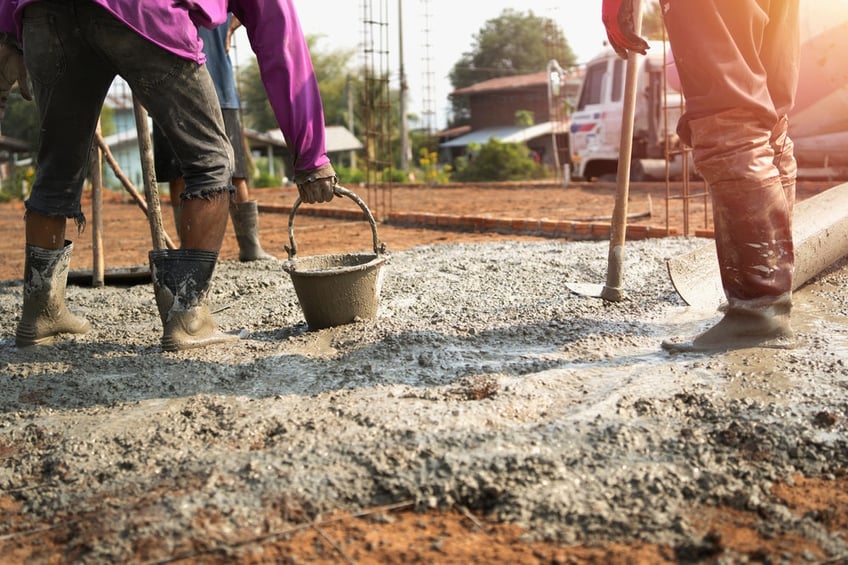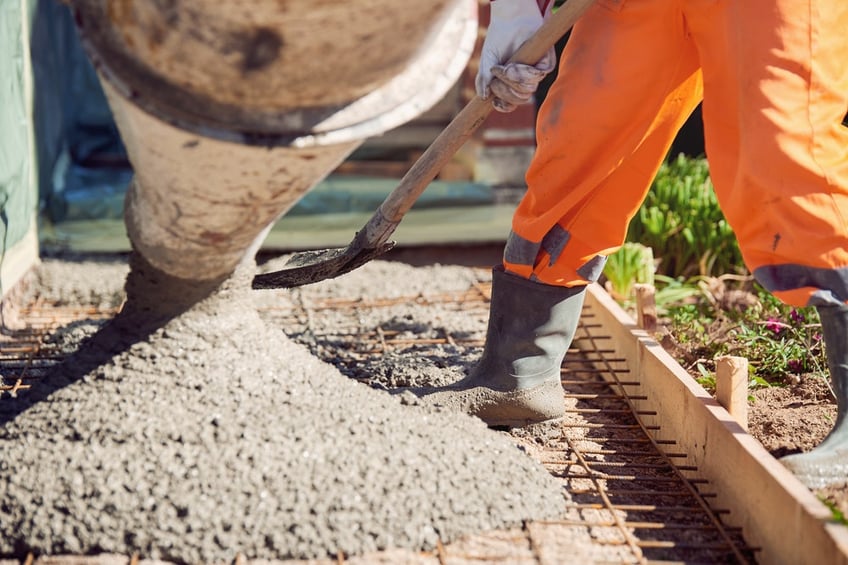At first glance, concreting might seem straightforward, but achieving a perfect pour requires skill, experience, and precision. Modern concrete applications go far beyond pedestrian walkways or industrial buildings. Today, concrete plays a vital role in everything from decorative driveways to the bricks that safeguard homes, showcasing its evolving versatility.
If you're planning a concrete project, whether for landscape or commercial use, it's essential to understand what to expect from a contractor, average concrete prices, and the overall process.
Discover rates for a wide range of machinery and services in our comprehensive rates guide.
Find trusted concrete contractors today
What is a concrete contractor?
Put simply, a concrete contractor is an expert professional trained in mixing, working with, laying, and repairing concrete. Their job is essential and calls for attention to detail. What they mix, how they pour, and even the prefabrication methods they use will determine the safety of individuals who live in a building, walk across a bridge, or even rely on concrete retaining walls because their home is situated on a slope.
Concrete begins as unmixed material, but it’s concrete contractors who go through the process of getting it to its hard-finished form. They’ll also perform associated tasks such as land or site preparation, formwork (related to crafting concrete in special shapes and designs), and concrete placement into these forms before finishing compaction and curing methods.
What does a concrete contractor do?
Australia is in the midst of a massive growth spurt when it comes to construction and development. In 2017 alone, more than 30 million cubic metres of concrete were produced across the country, which puts the industry at record growth. Besides this, 30,000 people are directly employed by the industry, and 80,000 people are in positions related to concrete construction. And it’s not just Australia — people worldwide rely more than ever on concrete for their building needs. Seventy per cent of the world’s population lives in structures that use concrete.
Concrete contractors are in demand because concrete is an incredibly flexible building material. Contractors work with the material according to the project’s needs. For example, their expertise would help them mix the right materials to create a type of concrete that works for a bridge — which would be vastly different than mixes required for landscape masonry, concrete foundations, concrete driveways, and more. So a concrete contractor will excavate a path (if, for example, they’re laying a driveway) and clear the land of debris like tree stumps, rocks, and other organic and inorganic matter. They’ll also grade the land, which means it will be level enough when the concrete gets laid on the surface.
Depending on the drainage needs of the soil and land, concrete contractors may also install a sub-base of compacted gravel. That’s why a concrete contractor needs expert knowledge in related niches like geology, equipment operation, understanding and reading architectural plans, and project management. They also need to understand workplace health and safety to avoid common hazards in the construction industry.

What to look for in a concrete contractor?
Concreting cost is what most commercial and residential property owners look at and consider first. However, that’s only one of the factors that count. Concrete construction requires expertise and experience in real-world applications. There should be a clear structure in place when it comes to starting and finishing your project successfully. And any high-quality concrete contractor will be able to walk you through what it will take to execute your vision. When you’re looking for a concrete contractor, use the following information to compare quotes and select the best one for your project:
- Education and experience
- Past customer reviews
- Company reviews (contractors are only as good as the company that supports them)
- Suppliers (this is a big one because a shaky relationship with suppliers could mean that they’re unreliable with project costs or that your project may stall because of a lack of materials)
- Licences (Some Australian states require concrete contractor licencing, so ensure that your concrete contractor can provide proof of these requirements. Additionally, confirm that the contractor will cover the minutiae of your project, like securing the necessary permits.
How much does concreting cost?
Concreting prices are generally affordable, but they can vary based on several factors, including the quality of materials, the expertise of your concrete contractor, and the specific service you need. For example, coloured concrete costs may differ from the price of standard concrete, and creating an exposed aggregate concrete surface for a driveway could be priced differently from installing a polished concrete floor or pouring a slab for a shed.
Across Australia, concreting costs will run you anywhere between $25 to $60 per square metre on a concreting project. There’s also some variation between Australian states, so you’re likely to encounter a range of concrete prices depending on where you’re located.
- ACT: $20 to $35 per square metre
- VIC: $25 to $40 per square metre
- SA: $30 to $45 per square metre
- QLD: $30 to $45 per square metre
- NSW: $35 to $50 per square metre
- WA: $40 to $55 per square metre

How much does a concrete slab cost?
One of the most common concreting jobs, especially for concrete construction needs, is creating and laying concrete slabs. Slabs are usually created for housing, creating concrete surfaces, or building foundations, so property owners must look for experience and quality when hiring concrete contractors for these projects.
Concreting costs for a slab depend on several factors, like the thickness of the slab itself and the type of slab formed. Variations include one-way slabs on beams, waffle slabs used for building reinforcements, flat plates supported by columns and walls, and even hollow-core slabs to increase structural strength and act as service ducts. In Australia, concrete slab prices can range from $64 to $150.
How long does concreting take?
The curing process for concrete varies. While it’s true that poured concrete is solid enough to walk on without leaving any indentations or footprints after about 48 hours, the curing process takes a full four weeks to complete. That’s because concrete continues to cure and harden as it’s exposed to the environment around it. While you may be able to lift the forms that surround poured concrete after about 3 to 5 days, this phase of concrete is still considered “green” or “young.” In reality, it takes around 28 to 30 days for concrete to come to full industrial strength.
Find the right Concrete Contractor on iseekplant
If you’re struggling to find the right concreting services for your next project, your search is over. At iseekplant, we’re Australia’s largest construction hire marketplace. Our large directory for suppliers, including concrete contractors, allows you to compare companies, reviews, and quotes for your next project. Do a quick search today and find a concrete contractor near you now!


